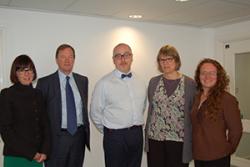Important piece of Health Service Improvement research begins
An important new piece of research about the best ways to incorporate patients and service users’ opinions to improve the Health Services has begun in earnest at Bangor University this week.
 Dr Chris Burton (centre) with Prof Jo Rycroft-Malone (l) and Dr Nicky Callow (r), with Bill Lucas and Fiona Reed of the Health Foundation at an inaugural research meeting.Dr Christopher Burton, a Senior Research Fellow with the School of Healthcare Sciences at Bangor University, was awarded a prestigious Health Foundation Fellowship. The three year award will now see him working with a team of improvement scientists, researching up to 10 improvement projects across the UK, to learn how improvements work, and what is effective in delivering the desired impacts for organisations, staff and patients. The overall aim will be to create better outcomes for patients.
Dr Chris Burton (centre) with Prof Jo Rycroft-Malone (l) and Dr Nicky Callow (r), with Bill Lucas and Fiona Reed of the Health Foundation at an inaugural research meeting.Dr Christopher Burton, a Senior Research Fellow with the School of Healthcare Sciences at Bangor University, was awarded a prestigious Health Foundation Fellowship. The three year award will now see him working with a team of improvement scientists, researching up to 10 improvement projects across the UK, to learn how improvements work, and what is effective in delivering the desired impacts for organisations, staff and patients. The overall aim will be to create better outcomes for patients.
There are many improvement projects across the UK, and much of the research by improvement scientists into their effectiveness, looks at different strategies adopted to improve performance.
What is new about Dr Burton’s approach is that he is interested in studying the effect of Patient and Public Involvement (PPI) in health improvement projects. He aims to develop new skills and theoretical insights in improvement science, and to develop specialist expertise around patient and public involvement.
Because patients are central to healthcare, patient and public involvement is a component of nearly all improvement work, bringing information about experiences, preferences and the consequences of change. However, Chris thinks that so far PPI has received little attention from improvement science, and understanding more about it would be hugely beneficial to healthcare improvement.
‘I’m focussing on improvement projects that include PPI which may develop very different resources and insights for health organisations. PPI is so interesting because it’s occurring in so many areas of improvement work, and we’ll find there is an enormous amount of learning we can use to our advantage. It feels like it is a growing field of practice and I think the potential to develop science in this area is enormous.’
‘I want to capture a rich picture of the influence that PPI has throughout the interplay of an organisation’s improvement work. Not just how it shapes a project, but the type of peripheral learning and feedback that it generates. I hope to show how tapping into this open resource can add significant value to an organisation’s improvement work, enhance the experience of the people involved in that work, and overall create better outcomes for patients.‘
Healthcare improvement work can encompass anything from infrastructure changes that support improvement, to organisational partnerships or changes to systems and practices. Chris will be planning this work with reference to a theory known as ‘the resource based view of the firm’ which sees organisations as a complex mix of resources, including the experience and skills of their staff. He’s interested in how these resources are shaped by improvement work.
‘All organisations try to maximise the resources they have to increase their capacity to deliver high quality services. I’m trying to identify why organisations invest time and energy doing improvement work, and the value it adds to their organisation. By applying tested theory, I’m hoping to discover rational reasons about why improvement projects work,’ he explains.
Chris Burton holds a PhD in health sciences and is interested in how organisations go about improvement work – particularly when it comes to collaborating with patients and the public, and the kinds of pitfalls and successes experienced.
Publication date: 13 May 2013
